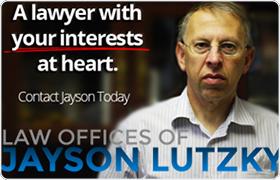Bronx County, NY Real Estate Lawyers
Sponsored Law Firm
-
 x
x

Click For More Info:
-
Jayson Lutzky PC
1740 Hone Avenue Bronx, NY 10461» view mapReal Estate Law The Choice For Law In The Bronx
Jayson Lutzky has 30 years of proven legal experience, both as a trial litigator and as a tough negotiator. Jayson has represented thousands of satisfied clients.
800-781-4910
Jayson Lutzky
✓ VERIFIEDAccident & Injury, Bankruptcy, Divorce & Family Law, Estate, Real Estate
Jayson Lutzky has 30 years of proven legal experience, both as a trial litigator and as a tough negotiator. His reasonably priced legal representation... (more)
Michael Drezin
✓ VERIFIEDContract, Construction Contracts, Real Estate Other
Michael Who? My name is Michael Drezin. A lot of my clients get the last name wrong cause they don't use it much. I've lived in the Bronx since ... (more)
Wesley M. Serra
Products Liability, Medical Malpractice, Transportation & Shipping, Construction
Status: In Good Standing
Richard W. Berne
Construction, Transportation & Shipping, Products Liability, Medical Malpractice
Status: In Good Standing
FREE CONSULTATION
CONTACTMichael B. Dubow
Dispute Resolution, Construction, Labor Law, Medical Malpractice
Status: In Good Standing
Christopher J. Marengo
Criminal, Estate Planning, Personal Injury, Real Estate
Status: In Good Standing Licensed: 39 Years
Peter T. Nguyen
Real Estate, Divorce, Bankruptcy, Personal Injury
Status: In Good Standing Licensed: 26 Years
Frank Vozza
Real Estate, Health Care, Consumer Rights, Personal Injury, Accident & Injury
Status: In Good Standing
 Jayson Lutzky Bronx, NY
Jayson Lutzky Bronx, NY Practice AreasExpertise
Practice AreasExpertise


